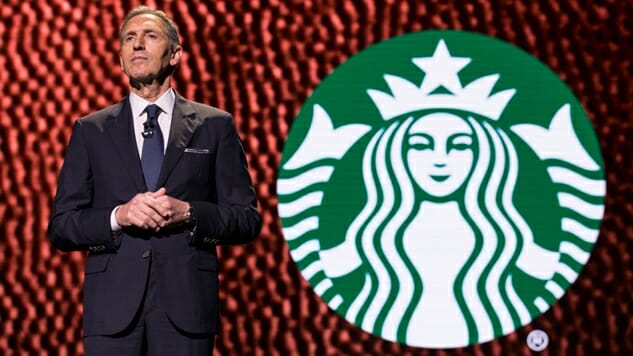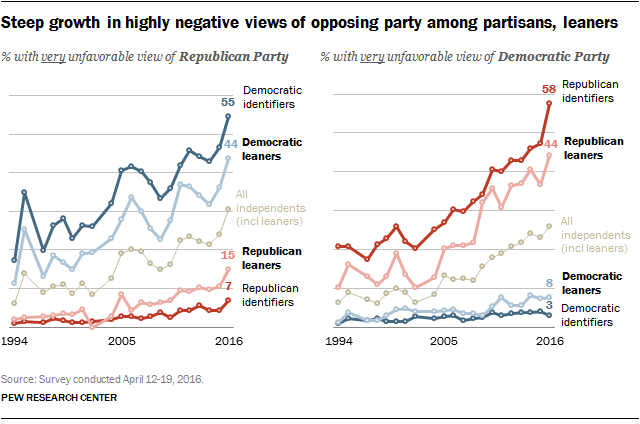Note to Howard Schultz: Political Independents Are Not Moderates
Photo by Stephen Brashear/Getty
If you only get your news through television, it’s understandable to be a bit flummoxed by my headline. The both-sides worldview that dictates most of TV news’ coverage depicts an America divided by party, with the supposed “rational center” occupying the supposed middle of the ideological spectrum between Partisans Who Simply Don’t Understand What Works Like Us Very Serious People Do. This is an incorrect interpretation of polling and the ideological spectrum, as politics has far more than two sides to every issue (as exemplified by the mind-blowing fact that a majority of Republicans want socialized medicine).
Firstly, Democrats are not automatically universally liberal, as the Democratic Party of the 1990s would have been completely unrecognizable to the Democratic Party of the 1930s and 1960s. Republicans are not automatically universally conservative, as their stance on Medicare for All proves. This is why George Washington warned us of the danger of political parties in his farewell address. Democrats and Republicans have claimed the entirety of the political spectrum, and they reinforce this false narrative through their state TV outlets. All the while, liberalism and conservatism have existed for centuries independent of our nation’s capital that is clearly run by the highest bidder.
Independents are not moderates. I am an example of this maxim, as I have been a registered independent since 2008, yet I approach the 2020 Democratic Primary wondering how on Earth I could ever come to support anyone other than Elizabeth Warren or Bernie Sanders. I abandoned the Democratic Party after I graduated high school because of how cozy it was with Wall Street, and I enthusiastically viewed Barack Obama’s Wall Street-centric campaign in 2008 similarly to how I look at Warren and Sanders now.
My most vehement political belief is that the last 40 years of policy by both parties was mostly an unmitigated disaster (the GOP far more so than the Dems, which is why I will never ever ever ever vote for any Republican in this iteration of the party), and anyone proposing a platform that attempts to reverse the monstrosity that is the last 40 years of bipartisan neoliberalism has my attention. Kamala Harris lost me the moment she started echoing Bill Clinton’s milquetoast politics with her tax credit proposal, as they pale in comparison to Elizabeth Warren’s wealth tax on assets over $50 million and $1 billion. The difference between Harris and Warren’s 2020 economic platform is the difference between traveling to Alaska or Mars.
Data from Pew before we had a President Trump demonstrates that I am not an outlier, and I am simply following a larger national trend. Independents are becoming more polarized.
Which is why former Starbucks CEO Howard Schultz’s 2020 presidential campaign is so incredibly misguided (well, among many other misguided reasons). Per Axios:
A Schultz adviser tells me his team sees opportunity in “the most moderate population the country’s ever had,” with so many “disengaged and disenchanted.”
—In the latest Gallup data, 39% of people see themselves as independents, 34% as Ds and 25% as Rs.
—The adviser said research by the Schultz team shows a centrist independent would draw evenly from the Republican and Democratic nominees, and bring Trump down to a “statistical floor of 26-27-28 percent.”
This take would not pass my 100-level political science courses from college. “Independent” is simply a description of your political registration within the United States, while “moderate” is a description of a political worldview. Schultz’s top adviser on this wild goose chase is longtime GOP operative/Sunday news TV show character Steve Schmidt, who was the 2002 National Republican Congressional Committee Communications Director, Deputy Assistant to President Bush and Counselor to Vice President Dick Cheney, and head of John McCain’s 2008 presidential campaign. If I have access to a Pew poll proving beyond a shadow of a doubt that “independent” does not automatically equal “moderate,” then Schmidt does too.
Schmidt knows better than this. His success getting Republicans elected this century is proof. He is simply taking stupid money that’s being handed out by someone with more cash than sense, and part of me can’t help but tip my cap in this instance to a man who has used his career to advance the billionaire austerity agenda that I so abhor.
This means that Howard Schultz is the one who cannot wrap his head around this very basic construct of political science. The man simply has not demonstrated any measure of political intelligence in his early bid for the presidency, as proven by his independent campaign that’s far more likely to elect Trump than himself.
America is a mostly liberal country, and despite our partisan squabbles, we agree on a lot of fundamental aspects of politics, as I highlighted in my piece about Alexandria Ocasio-Cortez shifting the Overton Window to the left:
Four out of five Americans think wealthy people have too much power and influence in Washington. A nice 69% of us think large businesses have too much power and influence in our nation’s capital, while 65% think our economic system “unfairly favors powerful interests,” and 59% (43% of Republicans) believe that corporations make “too much profit.” Americans largely identify with the economics of the mid-20th century, while our ruling class wants us to believe that the only economic system that we have ever known is the one we have experienced over the last 40 years.
Ninety percent of our media is owned by six conglomerates, and those six conglomerates have a fiduciary responsibility to their investors to maximize their profits. This leads to presenting a worldview on TV news that is in concert with those conglomerates’ profits, as it emphasizes a political worldview where both parties are on equal footing. This fundamental mischaracterization of U.S. politics has been largely rejected by a significant majority of America as the GOP has become more extreme in the age of Trump, as even a majority of Democrats think that “news sources report news they know to be fake, false or purposely misleading.”
It’s this kind of bankrupt “both-sides” worldview peddled by major media that leads less-informed folks who don’t have the time to get a political science degree to come away with the same misinformed worldview as the out-of-touch plutocrats who invest in major media. So many people have internalized the technically true but inherently misleading notion that 45% of each side of America has made up its mind, and presidential elections are just a battle for that remaining 10% “middle.”
That is a fairly accurate depiction of usual voters, but as those statistics I cited above demonstrate, it is not emblematic of the entire country. Around half of the electorate does not vote in presidential elections, and as progressive stalwarts like Alexandria Ocasio-Cortez are proving, you can recruit a lot of people to vote with an aggressive agenda for the 99% of us who do not make over $420,000 per year. From a pure mathematical perspective, there are far more persuadable non-voters that exist than consistent voters who could be persuaded to vote for either Trump or a Democrat. Independents are not automatically moderates, they’re more likely to be people like me, who are sick of the only economic and political system we have ever known, and simply want a change resembling the policies that worked before the catastrophe of the last 40 years.
Jacob Weindling is a staff writer for Paste politics. Follow him on Twitter at @Jakeweindling.
